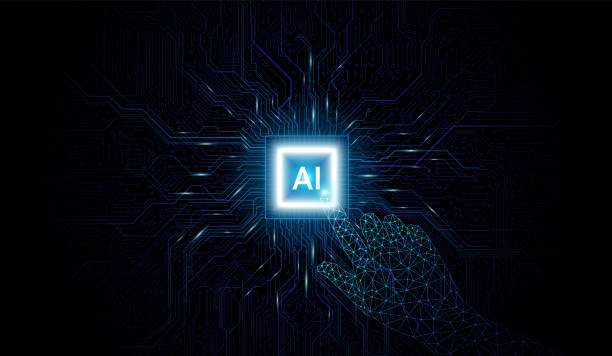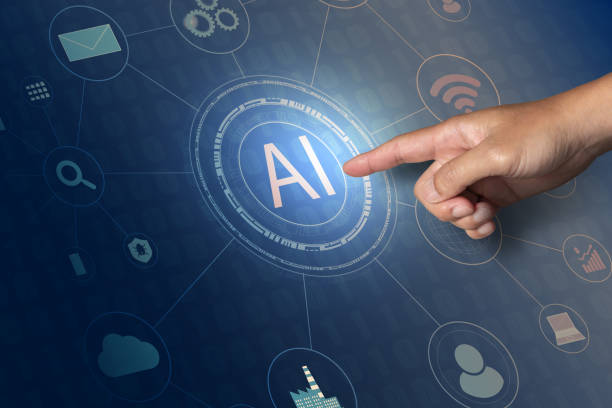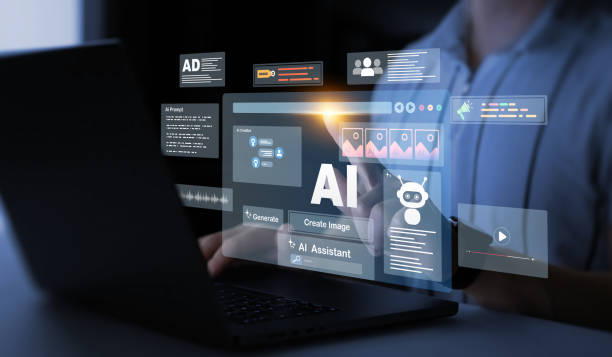What is Artificial Intelligence? Definition and Fundamental Concepts

#Artificial_Intelligence (artificial intelligence) or (AI) in short, refers to the ability of a computer system to perform tasks that usually require human intelligence.
These tasks include learning, reasoning, problem-solving, perception, and understanding natural language.
Artificial intelligence tries to simulate these abilities in machines using algorithms and mathematical models.
In fact, artificial intelligence is a broad field that includes various techniques and approaches.
Fundamental concepts of artificial intelligence include Machine learning, Deep learning, Neural networks, Natural Language Processing (NLP), Computer Vision, Robotics, and Expert Systems.
Artificial intelligence is currently used in various industries including healthcare, finance, transportation, manufacturing, and entertainment and has the potential to create fundamental changes in how we live and work.
The main goal of artificial intelligence is to build machines that can act intelligently.
This intelligence can include decision-making, prediction, solving complex problems, and learning from experiences.
Artificial intelligence has many branches, each of which addresses a specific aspect of intelligence.
Are you tired of your company’s website not being seen as it should be and losing potential customers? Solve this problem forever with a professional and effective website design by Rasaweb!
✅ Increase brand credibility and gain customer trust
✅ Attract targeted sales leads
⚡ Contact us now for a free consultation!
A Brief History of Artificial Intelligence from Beginning to Today

The history of artificial intelligence dates back to the 1950s, when scientists such as Alan Turing and John McCarthy laid the theoretical foundations of this field.
Turing presented a criterion for measuring machine intelligence by presenting the Turing Test.
McCarthy also coined the term “artificial intelligence” and held a conference in Dartmouth that is recognized as the official starting point of the discipline.
In the early decades, artificial intelligence was met with great enthusiasm and significant progress was made in the field of problem-solving and expert systems.
However, hardware and software limitations caused the field to face a period of stagnation known as the “AI winter.”
In the 1980s, artificial intelligence was revived with the advent of machine learning and neural networks.
Today, with remarkable advances in hardware and big data, artificial intelligence is rapidly advancing and we are witnessing its widespread applications in our daily lives.
Artificial intelligence has become an indispensable tool in many industries.
From early systems capable of playing simple games to today’s complex deep learning algorithms, artificial intelligence has come a long way.
These developments reflect continuous advances in hardware and software that enable the processing of more data and the development of more complex algorithms.
These advances have led to the creation of systems capable of doing things that seemed impossible just a few years ago.
Types of Artificial Intelligence Approaches and Classifications

Artificial intelligence can be categorized based on various criteria.
One of the most common classifications is based on the capabilities and efficiencies of artificial intelligence.
In this classification, artificial intelligence is divided into two general types: Weak or Narrow AI and Strong or General AI.
Weak artificial intelligence is designed to perform a specific task and performs very well in that area.
For example, a facial recognition system or Siri voice assistant are examples of weak artificial intelligence.
In contrast, strong artificial intelligence has cognitive abilities similar to humans and can perform any task that a human can perform.
Currently, strong artificial intelligence is still in the research phase.
Another classification of artificial intelligence is based on the approaches used in its development.
In this classification, approaches such as machine learning, deep learning, expert systems, and knowledge-based reasoning can be mentioned.
In general, understanding the different types of artificial intelligence and different approaches to its development is essential to better understand the potentials and limitations of this technology.
This awareness helps us understand how artificial intelligence can impact different areas of our lives.
| Type of Artificial Intelligence | Description | Examples |
|---|---|---|
| Weak AI (Narrow AI) | Designed to perform a specific task. | Siri, Alexa, facial recognition systems |
| Strong AI (General AI) | Has cognitive abilities similar to humans. (Still in the research phase) |
(No operational examples yet) |
Widespread Applications of Artificial Intelligence in Various Industries

Artificial intelligence is currently widely used in various industries including healthcare, finance, transportation, manufacturing, and entertainment.
In healthcare, artificial intelligence is used to diagnose diseases, develop new drugs, personalize treatment, and improve patient care.
In finance, artificial intelligence is used to detect fraud, manage risk, provide financial advice, and automate financial processes.
In transportation, artificial intelligence is used to develop self-driving cars, optimize traffic, and improve transportation safety.
In manufacturing, artificial intelligence is used to automate production lines, control quality, and predict equipment failures.
In entertainment, artificial intelligence is used to produce creative content, provide personalized recommendations, and improve the user experience.
Artificial intelligence is expanding rapidly and it is expected that in the near future, we will see more applications of it in various industries.
This expansion of applications means new opportunities and new challenges for businesses and individuals.
Are you disappointed with the low conversion rate of your online store? Rasaweb will turn your online store into a powerful tool for attracting and converting customers!
✅ Significant increase in visitor-to-buyer conversion rate
✅ Exceptional user experience to increase customer satisfaction and loyalty⚡ Get a free consultation from Rasaweb!
Machine Learning, the Beating Heart of Artificial Intelligence

Machine learning, as a subset of artificial intelligence, plays a vital role in the development of intelligent systems.
In machine learning, machines are able to learn and improve their performance using data and algorithms, without being explicitly programmed.
This learning process takes place through pattern recognition, knowledge extraction, and the creation of predictive models.
There are different types of machine learning algorithms, including supervised learning, unsupervised learning, and reinforcement learning.
Supervised learning uses labeled data to train the model, while unsupervised learning uses unlabeled data to discover patterns and structures.
Reinforcement learning trains machines to make optimal decisions through trial and error and receiving rewards or penalties.
Machine learning is currently used in a wide range of applications, including facial recognition, speech recognition, recommenders, and self-driving cars.
These applications demonstrate the high potential of machine learning in improving our lives.
Challenges and Limitations of Artificial Intelligence

Despite the remarkable advances in artificial intelligence, this technology still faces significant challenges and limitations.
One of the most important challenges is the need for large and high-quality data to train machine learning models.
Collecting and processing this volume of data can be time-consuming and costly.
Another challenge is the issue of bias in data.
If the data used to train the models is biased, the models also learn the bias and make unfair decisions.
In addition, the explainability of artificial intelligence models is also an important challenge.
In many cases, it is difficult to understand why an artificial intelligence model made a particular decision.
This can reduce trust in artificial intelligence.
There are also concerns about the effects of artificial intelligence on employment and privacy.
Therefore, the responsible development and use of artificial intelligence requires attention to these challenges and limitations.
Another existing challenge is over-reliance on data.
Artificial intelligence systems often require vast amounts of data to learn and function effectively.
This dependence can be problematic because collecting and processing this data is time-consuming and costly.
Also, the quality of the data is very important, as incorrect or incomplete data can lead to undesirable results.
The Future of Artificial Intelligence Visions and Possibilities

The future of artificial intelligence is very bright and full of possibilities.
It is expected that artificial intelligence will play a more important role in our lives in the coming years and create fundamental changes in various industries.
Further advances in machine learning, deep learning, and robotics will lead to the development of smarter and more efficient systems.
Self-driving cars, smart virtual assistants, advanced disease detection systems, and surgical robots are just a few examples of the potential applications of artificial intelligence in the future.
However, the development of artificial intelligence also requires attention to ethical and social issues.
It must be ensured that artificial intelligence is used for the benefit of all members of society and does not violate the rights and privacy of individuals.
Also, it is necessary to plan for the effects of artificial intelligence on employment and create new opportunities for training and employment.
| Application Area | Potential Applications of Artificial Intelligence |
|---|---|
| Healthcare | Diagnosing complex diseases, personalized drugs, robotic surgery |
| Transportation | Fully autonomous vehicles, intelligent traffic management systems |
| Manufacturing | Automated and optimized production lines, precise quality control |
| Finance | Intelligent financial advice, advanced fraud detection |
Ethical Issues in Artificial Intelligence Justice and Transparency

The development and use of artificial intelligence raises important ethical issues that need to be addressed.
One of the most important ethical issues is the issue of fairness and justice in artificial intelligence decision-making.
Artificial intelligence systems should not discriminate and should make fair and equitable decisions.
To achieve this goal, it must be ensured that the data used to train the models is free of bias and that the models are designed to prevent discrimination.
Another issue is the issue of transparency in artificial intelligence decision-making.
It should be possible to explain why an artificial intelligence system made a particular decision.
This transparency increases trust in artificial intelligence and enables accountability.
In addition, issues related to privacy, security, and accountability should also be considered.
The development of appropriate laws and regulations for artificial intelligence is essential to ensure that this technology is used for the benefit of society.
One of the important aspects of this field is ensuring the transparency and explainability of artificial intelligence algorithms.
In many cases, decisions made by artificial intelligence systems are not understandable due to the complexity of the algorithms.
This issue can lead to distrust and concern about the use of these systems.
Are you dissatisfied with the low sales of your online store?
Rasaweb is your solution to having a professional and high-selling online store.
✅ Significant increase in sales and revenue
✅ Easy and enjoyable shopping experience for customers
⚡ Get free advice from Rasaweb now!
The Role of Humans in the World of Artificial Intelligence Interaction and Collaboration

Despite the remarkable advances in artificial intelligence, the role of humans in the intelligent world of the future will still be very important and vital.
Artificial intelligence cannot completely replace humans, but should be considered as a tool to help humans and increase their abilities.
Interaction and collaboration between humans and artificial intelligence can lead to better results than when each operates alone.
For example, doctors can use artificial intelligence to diagnose diseases more accurately, but the final decision on treatment will still be up to the doctor.
Also, humans can use artificial intelligence to automate repetitive and time-consuming tasks, so that they have more time for creative and innovative tasks.
Therefore, the focus should be on developing artificial intelligence systems that effectively collaborate with humans and enhance their abilities.
How Artificial Intelligence Transforms Our Lives

Artificial intelligence has dramatically affected our lives in various dimensions, and this transformation will continue at an even faster pace in the future.
Among the prominent impacts of artificial intelligence are the following.
Improving the quality of life by providing better health and medical services, safer transportation, and easier access to information.
Increasing productivity and efficiency in various industries by automating processes, reducing costs, and improving the quality of products and services.
Creating new job opportunities in areas related to artificial intelligence, such as software development, data analysis, and robotics engineering.
Personalizing the user experience in various fields, such as education, entertainment, and e-commerce.
Solving complex and global problems, such as climate change, poverty, and infectious diseases.
However, to fully benefit from the potential of artificial intelligence, its ethical and social issues must also be addressed and it must be ensured that this technology is used for the benefit of all members of society.
Artificial Intelligence #AI can significantly contribute to improving the quality of life.
By providing innovative and efficient solutions, artificial intelligence can help improve many aspects of life and lead to a better and more sustainable world.
Frequently Asked Questions
| Question | Answer |
|---|---|
| What is the definition of Hoosh Masnooee (Artificial Intelligence)? | It is a field in computer science aimed at creating intelligent machines that can think, learn, solve problems, and make decisions like humans. |
| Mention some common applications of artificial intelligence. | They include self-driving cars, voice assistants (such as Siri and Alexa), recommendation systems (such as Netflix and Amazon), facial recognition, and medical diagnosis. |
| What is the difference between Narrow Artificial Intelligence (ANI) and General Artificial Intelligence (AGI)? | Narrow Artificial Intelligence is specialized in one specific task, while General Artificial Intelligence possesses human intellectual ability to perform any cognitive task. |
| What is Machine Learning and its relationship to Artificial Intelligence? | Machine learning is a branch of artificial intelligence that focuses on developing algorithms that allow systems to learn from data without explicit programming. |
| What are Artificial Neural Networks? | They are computational models inspired by the structure and function of the human brain, and are used in deep learning to process data and discover complex patterns. |
| Mention some ethical challenges related to artificial intelligence. | They include privacy issues, bias in data and algorithms, job loss, and responsibility in case of errors or unfair decisions. |
| What is Natural Language Processing (NLP)? | It is a branch of artificial intelligence that focuses on enabling computers to understand, interpret, and generate human language in a useful and interactive way. |
| How can artificial intelligence affect the labor market? | It can lead to the automation of some routine tasks, requiring the retraining of workers and creating new jobs in the design, development, and maintenance of artificial intelligence systems. |
| What is Computer Vision? | It is a field in artificial intelligence that enables computers to “see,” understand, and interpret images and videos in the same way humans do, enabling them to recognize objects and faces. |
| What is the importance of data in developing artificial intelligence systems? | Data is the fuel that powers artificial intelligence systems, especially in machine learning. The quality and quantity of data greatly affect the accuracy and performance of models and their ability to learn and make correct decisions. |
And other services of Rasa Web Advertising Agency in the field of advertising
Intelligent Data Analysis: A new service to improve SEO ranking by designing an attractive user interface.
Intelligent Custom Software: A fast and efficient solution to increase site visits by focusing on optimizing key pages.
Intelligent Direct Marketing: A fast and efficient solution to attract customers by focusing on intelligent data analysis.
Intelligent Conversion Rate Optimization: A dedicated service for online growth based on the use of real data.
Intelligent Website Development: A combination of creativity and technology to attract customers by optimizing key pages.
And more than hundreds of other services in the field of internet advertising, advertising consulting and organizational solutions
Internet Advertising | Advertising Strategy | Advertorial
Sources
Analytical Artificial Intelligence and its Applications
,MindTools: Analytical Skills
,Towards Data Science: Analytical Thinking Skills Every Data Scientist Needs
,IBM: Artificial Intelligence (AI)
? In Rasaweb Digital Marketing Agency, your online dreams come true! We bring your business to the peak of success by providing services such as exclusive website design, professional SEO and social media management. Contact us today for a free consultation and build your digital future.
📍 Tehran, Mirdamad Street, next to the Central Bank, South Kazeroun Alley, Ramin Alley No. 6




